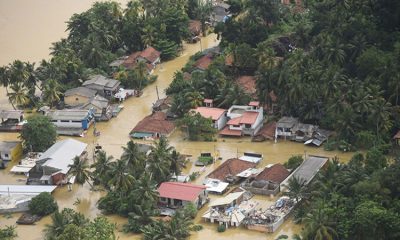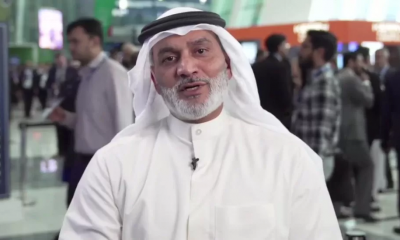Business
Oil prices rise following Hamas attack on Israel

Oil prices have jumped on concerns that the situation in Israel and Gaza could disrupt output from the Middle East.
Brent crude, the international benchmark, climbed by $2.25 a barrel to $86.83, while US prices also rose. Israel and Palestinian territories are not oil producers but the Middle Eastern region accounts for almost a third of global supply.
Hamas’s assault on Israel was the biggest escalation between the two sides for decades.
Western nations condemned the attacks. A spokesperson for Hamas, the Palestinian militant group, told the BBC that the group had direct backing for the move from Iran – one of the world’s largest oil producers. Iran denied involvement in the assault at a UN Security Council meeting in New York on Sunday, Reuters reported. But Iranian President Ebrahim Raisi has expressed support for the attack.
Energy analyst Saul Kavonic told the BBC that global oil prices have risen “due to the prospect of a wider conflagration that could spread to nearby major oil-producing nations such as Iran and Saudi Arabia”.
On Monday morning, the price of West Texas Intermediate crude, the US benchmark, was up $2.50 a barrel at $85.30.
“If the conflict envelops Iran, which has been accused of supporting the Hamas attacks, up to 3% of global oil supply is at risk,” Mr Kavonic added.
Caroline Bain, chief commodities economist at Capital Economics, told the BBC’s Today programme that Iran had been increasing oil production over the course of this year despite US sanctions. “The US seems to have turned a blind eye to a steady increase in Iranian production, that… is going to be more difficult for the US to ignore going forward from here,” she said.
Overall, Ms Bain said Capital Economics expected demand for oil to exceed supply in the final three months of the year and “that should support higher prices”.
Mr Kavonic said that about a fifth of global supply would be “held hostage” if passage through the Strait of Hormuz, a vital oil trading route is disrupted. The Strait of Hormuz is crucial for the main oil exporters in the Gulf region, whose economies are built around oil and gas production.
Uncertainty over how events could develop in the coming days may also drive investments into US Treasury bonds and the dollar, which investors traditionally buy at times of crisis, said James Cheo from HSBC bank.
On Monday, Israel’s central bank said it would sell up to $30bn of foreign currency in a bid to calm markets and support the country’s own currency, the shekel, which has fallen sharply. “At this stage, there is a bit of nervousness. Investors want to see a little more clarity, particularly on economic data and on developments associated with geopolitical uncertainty,” added Mr Cheo.
Following Russia’s invasion of Ukraine in February 2022, oil prices soared, hitting more than $120 a barrel in June last year. They fell back to a little above $70 a barrel in May this year, but have steadily risen since then as producers have tried to restrict output to support the market. Saudi Arabia, a major oil producer, said it would make cuts of a million barrels per day in July.
Other members of Opec+, a group of oil-producing countries, also agreed to continued cuts in production in an attempt to shore up flagging prices. Opec+ accounts for around 40% of the world’s crude oil and its decisions can have a major impact on oil prices.
(BBC)
Business
ADB approves support to strengthen power sector reforms in Sri Lanka

The Asian Development Bank (ADB) has approved a $100 million policy-based loan to further support Sri Lanka in strengthening its power sector. This financing builds on earlier initiatives to establish a more stable and financially sustainable power sector.
This second subprogram of ADB’s Power Sector Reforms and Financial Sustainability Program will accelerate the unbundling of the Ceylon Electricity Board (CEB) into independent successor companies for generation, transmission, system operation, and distribution, as mandated by the Electricity Act of 2024 and its 2025 amendment. The phased approach ensures a structured transition, ensuring progress in reform actions and prioritizing financial sustainability.
“Sri Lanka has made important progress in stabilizing its economy and strengthening its fiscal position. A well-functioning power sector is vital for the country’s continued recovery and sustainable growth,” said ADB Country Director for Sri Lanka Takafumi Kadono. “ADB is committed to supporting Sri Lanka’s long-term development and advancing key reforms in the power sector. This initiative will enhance power sector governance, foster private sector participation, and accelerate renewable energy development to drive sustainable recovery, resilience, and inclusive growth.”
To improve financial sustainability, the program will help implement cost-reflective tariffs and a comprehensive debt restructuring plan for the CEB. It will support the new independent successor companies in transparent allocation of existing debts. This will continue to strengthen their financial viability, enhance creditworthiness, and enable these companies to operate on a more sustainable footing.
The program also aims to strengthen renewable energy development and private sector participation by enhancing transparency and supporting power sector entities that are financially sustainable. It will enable competitive procurement for large-scale renewable energy projects and identified priority generation schemes, while upholding strong environmental standards.
Promoting gender equality and social inclusion is integral to the program. Energy sector agencies have implemented annual women’s leadership programs, adopted inclusive policies, and launched feedback mechanisms to ensure equitable participation of female consumers and entrepreneurs. The program includes targeted support for vulnerable groups, such as maintaining lifeline tariffs and implementing measures to soften the impact of tariff adjustments and sector reforms.
ADB will provide an additional $2.5 million technical assistance grant from its Technical Assistance Special Fund to support program implementation, build the capacity of successor companies, and help develop their business plans and power system development plans.
Business
Union Assurance becomes first insurer to earn the YouTube Silver Play Button

Union Assurance, Sri Lanka’s longest-standing private Life Insurer, has achieved a milestone in its digitalisation journey by being awarded the YouTube Silver Play Button, recognising the Company for surpassing 100,000 subscribers on its official channel. This achievement marks a first in Sri Lanka’s Insurance industry, across both Life and General Insurance, and underscores Union Assurance’s pioneering role in digital engagement.
This accomplishment reflects the Company’s unwavering commitment to making Life Insurance accessible, simplified, and engaging for all Sri Lankans. Through innovative content strategies, Union Assurance has successfully transformed complex Insurance concepts into relatable, informative, and inspiring narratives that empower individuals to protect what matters most; health, wealth, family, and future.
Receiving the Silver Play Button is more than a symbolic accolade; it is a testament to the strength and credibility of Union Assurance’s digital presence. In an era where trust and transparency define brand loyalty, this recognition validates the company’s ability to create content that resonates deeply with a growing audience. It enhances the brand’s authority, reinforces its visibility across digital platforms, and further solidifies Union Assurance as a leader in customer engagement.
Celebrating this achievement, Mahen Gunarathna, the Chief Marketing Officer at Union Assurance stated: “This milestone is a testament to the trust and engagement of our audience and reflects our dedication to innovation, transparency, and customer-centric communication.
Business
LOLC Finance Factoring powers business growth

LOLC Finance PLC, the largest non-banking financial institution in Sri Lanka, brings to light the significant role of its Factoring Business Unit in providing indispensable financial solutions to businesses across the country. With a robust network of over 200 branches, LOLC Finance Factoring offers distinctive support to enterprises, ranging from small-scale entrepreneurs to corporate giants.
In light of the recent economic challenges, LOLC Finance Factoring emerged as a lifeline for most businesses, ensuring continuous liquidity to navigate through turbulent times. By facilitating seamless transactions through online platforms and expediting payments, the company played a pivotal role in sustaining essential services, including supermarkets and pharmaceuticals.
Deepamalie Abhaywardane, Head of Factoring at LOLC Finance PLC, emphasized the increasing relevance of factoring in today’s economy. “As economic conditions become more stringent, factoring emerges as the most sought-after financial product for businesses across various sectors. It offers a win-win solution by providing upfront cash up to 85% of the credit sale to suppliers while allowing end-users/buyers better settlement period.”
One of the standout features of LOLC Finance Factoring is its hassle-free application process. Unlike traditional bank loans that require collateral, LOLC Factoring extends credit facilities without such obligations. Furthermore, LOLC Finance Factoring relieves business entities of the burden of receivable management and debt collection. Through nominal service fees, businesses can outsource these tasks, allowing them to focus on core operations while ensuring efficient cash flow management.
For businesses seeking Shariah-compliant factoring solutions, LOLC Al-Falaah’s Wakalah Future-Cash Today offers an efficient and participatory financing model that meets both financial needs and ethical principles. Understanding the diverse challenges faced by businesses, LOLC Finance Factoring deliver tailored solutions that enhance cash flow, reduce credit risk, and support sustainable growth. Working together with LOLC Al-Falaah ensures access to a transparent, well-structured receivable management solution strengthened by the credibility and trust of Sri Lanka’s largest NBFI, LOLC Finance.
The clientele of LOLC Finance Factoring spans into various industries, including manufacturing, trading, transportation, healthcare, textiles, plantations, and other services, all contributing significantly to Sri Lanka’s economic growth. By empowering businesses with accessible and convenient working capital solutions, LOLC Finance’s Factoring arm plays a vital role in fostering economic development and prosperity of the country.
In the upcoming quarter, LOLC Finance Factoring remains committed to delivering innovative financial solutions tailored to meet the evolving needs of businesses. As Sri Lanka’s economic landscape continues to develop, LOLC Finance Factoring stands ready to support enterprises on their journey towards growth and success.
-

 News7 days ago
News7 days agoWeather disasters: Sri Lanka flooded by policy blunders, weak enforcement and environmental crime – Climate Expert
-
News4 days ago
Lunuwila tragedy not caused by those videoing Bell 212: SLAF
-

 News3 days ago
News3 days agoLevel III landslide early warning continue to be in force in the districts of Kandy, Kegalle, Kurunegala and Matale
-

 Latest News5 days ago
Latest News5 days agoLevel III landslide early warnings issued to the districts of Badulla, Kandy, Kegalle, Kurunegala, Matale and Nuwara-Eliya
-

 Features5 days ago
Features5 days agoDitwah: An unusual cyclone
-

 Latest News6 days ago
Latest News6 days agoUpdated Payment Instructions for Disaster Relief Contributions
-

 Latest News6 days ago
Latest News6 days agoLandslide Early Warnings issued to the Districts of Badulla, Colombo, Gampaha, Kalutara, Kandy, Kegalle, Kurunegala, Matale, Moneragala, Nuwara Eliya and Ratnapura
-

 News16 hours ago
News16 hours agoA 6th Year Accolade: The Eternal Opulence of My Fair Lady























